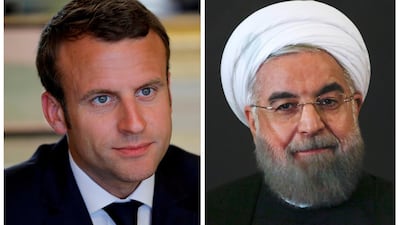French President Emmanuel Macron and his Iranian counterpart Hassan Rouhani agreed to work together to preserve the nuclear accord with Iran, even as the US makes it clear that Donald Trump will withdraw if the deal can’t be fixed to his satisfaction.
The pair spoke for more than an hour by phone on Sunday and “agreed to work mainly in the next few weeks on protecting the content of the 2015 agreement in all its aspects,” Mr Macron’s office said in an emailed statement.
The French president also told German Chancellor Angela Merkel and British Prime Minister Theresa May this weekend that he stressed during his trip to Washington last week that America must stay in the deal and integrate it in a larger framework, rather than walking away.
In a readout posted on Iran’s official government website, Mr Rouhani suggested Tehran isn’t interested in changing the accord, setting up a potential clash with the US approaching a critical deadline in May.
The Iranian website quoted Mr Rouhani as saying Iran won’t accept additional restrictions and that the deal, formally known as the Joint Comprehensive Plan of Action, is “by no means negotiable”.
Mr Trump set a May 12 deadline for the US and Europe to address issues that aren’t covered in the nuclear deal, and Iran has “considered a variety of responses for any decision that the United States is going to make”, according to its website.
US Secretary of State Mike Pompeo on Sunday hammered home his boss’s message: America will pull out of the Iran nuclear deal if the “flawed” accord can’t be fixed to its satisfaction.
“President Trump’s been pretty clear. This deal is very flawed,” Mr Pompeo said in Tel Aviv in a joint appearance with Israeli Prime Minister Benjamin Netanyahu. “He’s directed the administration to try and fix it, and if we can’t fix it, he’s going to withdraw from the deal. It’s pretty straightforward.”
The nuclear pact was signed by Iran, America, China, France, Russia, Germany, the UK and the European Union. It gives Iran the ability to enrich uranium for peaceful purposes. Mr Trump has called the accord “the worst deal ever”.

